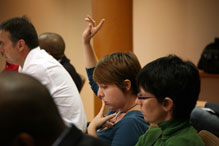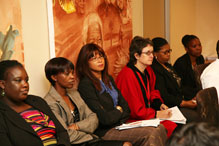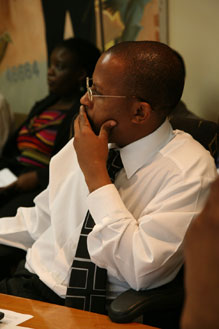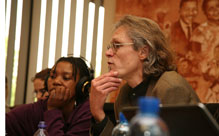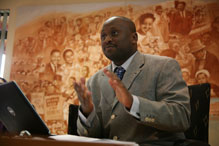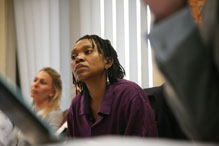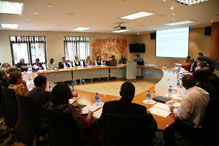
A workshop on the proposed Protection of Personal Information Act was held at the Nelson Mandela Foundation
September 30, 2009 – The Nelson Mandela Foundation hosted a workshop on the proposed Protection of Personal Information Act this morning at the Foundation’s offices.
The aim of the workshop, said the Foundation’s Head of Memory, Verne Harris, was “to determine what impact the proposed Act will have on archival and memory institutions”.
“Memory and archival institutions often deal with very personal information, so we’ve asked people from various organisations to join us to discuss the implications of the proposed Act,” said Harris.
The Bill was initially tabled in 2005, but after problems were identified a revised version was proposed in 2009.
According to the revised Bill, the aim of the Act is “to promote the protection of personal information processed by public and private bodies; to introduce information protection principles so as to establish minimum requirements for the processing of personal information; to provide for the establishment of an Information Protection Regulator; to provide for the issuing of codes of conduct; to provide for the rights of persons regarding unsolicited electronic communications and automated decision making; to regulate the flow of personal information across the borders of the Republic; and to provide for matters connected therewith.”
Harris said that he had been “pleasantly surprised by what we’ve seen from the revised Bill”.
“When the 2005 Bill was opened to debate we interrogated a number of different aspects. The Bill seemed to disappear, before this new revised version was put forward.
“The new Bill appears to take the role of memory institutions into account, though there are still concerns. In particular we’re interested in interrogating the role of the regulator as it pertains to memory organisations,” he said.
“It’s now up for discussion again and we hope that if there’s consensus [from today’s dialogue] we will be able to submit our findings from this dialogue for consideration.”
Harris highlighted the importance of the Promotion of Access of Information Act as it pertains to memory and archival institutions as well as to the citizens of the country, arguing that “access to information could be significantly impacted if the Protection of Personal Information Act is not handled correctly”.
Having gone through the processes generally followed by memory and archival institutions, the dialogue then examined the potential effect the proposed Act could have on those practices.
The debate focused on issues around the collection of personal information, retention of that information, maintaining the accuracy of that information, access to one’s own personal information and the processing of special personal information (defined by the Bill as “information about children, and data subject’s religion or philosophical beliefs, race or ethnic origin, trade union membership, political opinions, health, sexual life or criminal behaviour”).
With a team of lawyers on hand to clear up any legalese, the debate concluded that while the proposed Act had provided sufficient room for memory and archival work there was a strong need for the sector to develop a code of conduct to determine the legitimacy of the individual’s or organisation’s needs as they pertained to specific areas of the Protection of Personal Information Act.
Wrapping up the workshop, the Foundation’s Information Communications Manager, Sello Hatang, said: “We need to have a written submission with parliament by October 7 to address the concerns that we’ve raised here, including:
- the amendment of Section 25 to make it possible for archives to process special personal information;
- tightening the language used in Sections 15 and 32(b) so that it does not leave room for misinterpretation. As it is, the country is struggling with the implementation of the Promotion of Access of Information Act because of ambiguous language; and
- the sector needs to develop the code of conduct, which will include issues such as the fees structure and provide guidance on what should be considered as safeguards as outlined in Section 18.”
Former Foundation staff member Shadrack Katuu facilitated the dialogue. Among the organisations represented were: 46664, the ANC Archives, Eskom, the Freedom of Expression Institute, Historical Papers, the Law Reform Commission, law firms, the South African Human Rights Commission, South African Airways, the South African Broadcasting Corporation, South African History Archive, South African National Editors’ Forum, The Star newspaper, and the University of Pretoria.
“This was an important event for us,” continued Harris, “because it’s positioned in that nexus between memory and dialogue. It’s important for us to foster consultation and debate over those policies, which will govern how we will work.”
